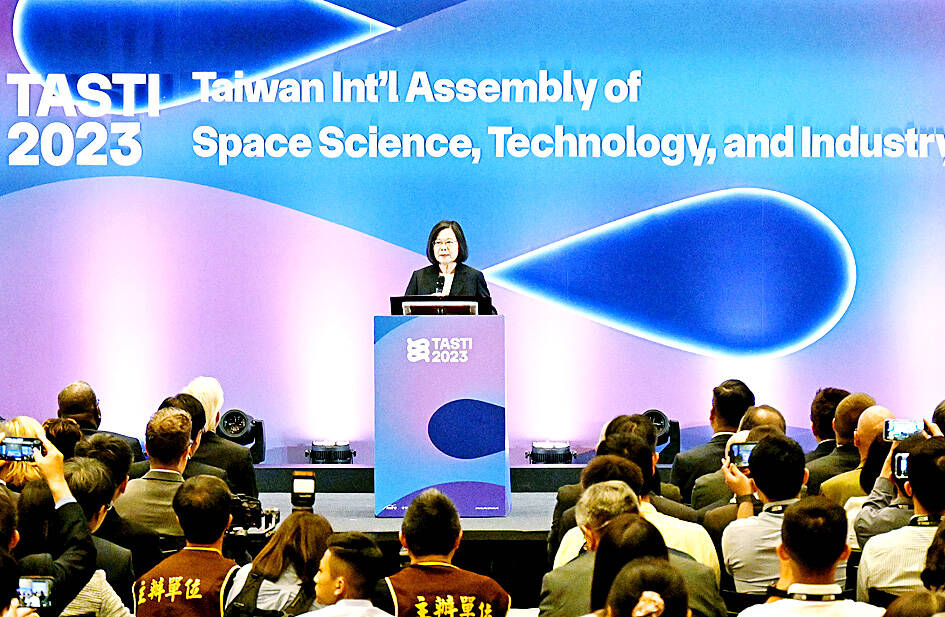The nation’s space development program is to receive an additional NT$40 billion (US$1.23 billion) in funding, President Tsai Ing-wen (蔡英文) said yesterday in a speech at the opening of the Taiwan International Assembly of Space Science, Technology and Industry in Taipei.
The launch of Taiwan’s first domestically produced weather satellite, Triton, earlier this month proves that the nation not only has advantages in semiconductors and precision manufacturing, but also the ability to enter the global space industry, Tsai said.
The additional funding for the third phase of the space development program — initiated in 2019 with an investment of NT$25.1 billion over 10 years — would go into supporting the development of low Earth orbit communication satellites, as well as national launch sites for satellites, she said.

Photo: Fang Pin-chao, Taipei Times
In a keynote speech, US Assistant Secretary of Commerce for Environmental Observation and Prediction Michael Morgan highlighted cooperative space projects that have brought together Taiwanese scientists and US engineers.
For example, the launch of Taiwan’s Formosat-7/COSMIC-2 satellites in 2019 was the largest science technology activity undertaken by Taiwanese and US authorities, Morgan said.
“We have seen that the data from this mission are critical in the operations of NOAA’s [the US National Oceanic and Atmospheric Administration] weather service,” he said.
The satellites reduced errors in global modeling data from NOAA by about 6 percent, he said.
The US Air Force’s 557th Weather Wing also uses this important data, he added.
The NOAA and the Center for Space and Remote Sensing Research at National Central University in Taoyuan are also collaborating on space-based marine oil pollution and marine debris monitoring, he said.
Taiwan’s Triton, also known as the Wind-Hunter Satellite, has potential for retrieving wind data, and assessing soil moisture and flood inundation, he added.
The near-surface wind retrievals are particularly valuable, providing crucial insights into understanding the structure of cyclones over oceans, he said.
“We have identified mutually beneficial collaboration on space weather through the accommodation of space weather instruments on the upcoming TASA [Taiwan Space Agency] and Formosat-8 spacecraft missions,” he said, referring to TASA’s ongoing development of six high-resolution optical satellites, known collectively as the Formosat-8 satellite constellation.
The five-day conference, the largest international showcase for Taiwan’s space industry, brings together public and private sector operators in space technology from countries including India, Japan and the US.
TASA, which hosts the annual conference, says the event serves as a platform for integrating the fields of science, technology and industry in the sector, to attract international attention to Taiwan’s space development and facilitate cooperation.
The conference includes forums, keynote speeches, academic presentations and exhibition booths where satellite and communication industry representatives display their latest developments.

TRUST: The KMT said it respected the US’ timing and considerations, and hoped it would continue to honor its commitments to helping Taiwan bolster its defenses and deterrence US President Donald Trump is delaying a multibillion-dollar arms sale to Taiwan to ensure his visit to Beijing is successful, a New York Times report said. The weapons sales package has stalled in the US Department of State, the report said, citing US officials it did not identify. The White House has told agencies not to push forward ahead of Trump’s meeting with Chinese President Xi Jinping (習近平), it said. The two last month held a phone call to discuss trade and geopolitical flashpoints ahead of the summit. Xi raised the Taiwan issue and urged the US to handle arms sales to

A magnitude 5.6 earthquake struck off the coast of Yilan County at 12:37pm today, with clear shaking felt across much of northern Taiwan. There were no immediate reports of damage. The epicenter of the quake was 16.9km east-southeast of Yilan County Hall offshore at a depth of 66.8km, Central Weather Administration (CWA) data showed. The maximum intensity registered at a 4 in Yilan County’s Nanao Township (南澳) on Taiwan’s seven-tier scale. Other parts of Yilan, as well as certain areas of Hualien County, Taipei, New Taipei City, Taoyuan, Hsinchu County, Taichung and Miaoli County, recorded intensities of 3. Residents of Yilan County and Taipei received

Taiwan has secured another breakthrough in fruit exports, with jujubes, dragon fruit and lychees approved for shipment to the EU, the Ministry of Agriculture said yesterday. The Animal and Plant Health Inspection Agency on Thursday received formal notification of the approval from the EU, the ministry said, adding that the decision was expected to expand Taiwanese fruit producers’ access to high-end European markets. Taiwan exported 126 tonnes of lychees last year, valued at US$1.48 million, with Japan accounting for 102 tonnes. Other export destinations included New Zealand, Hong Kong, the US and Australia, ministry data showed. Jujube exports totaled 103 tonnes, valued at

BIG SPENDERS: Foreign investors bought the most Taiwan equities since 2005, signaling confidence that an AI boom would continue to benefit chipmakers Taiwan Semiconductor Manufacturing Co’s (TSMC, 台積電) market capitalization swelled to US$2 trillion for the first time following a 4.25 percent rally in its American depositary receipts (ADR) overnight, putting the world’s biggest contract chipmaker sixth on the list of the world’s biggest companies by market capitalization, just behind Amazon.com Inc. The site CompaniesMarketcap.com ranked TSMC ahead of Saudi Aramco and Meta Platforms Inc. The Taiwanese company’s ADRs on Tuesday surged to US$385.75 on the New York Stock Exchange, as strong demand for artificial intelligence (AI) applications led to chip supply constraints and boost revenue growth to record-breaking levels. Each TSMC ADR represents